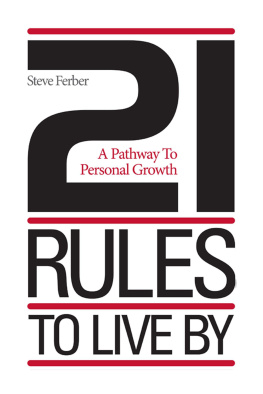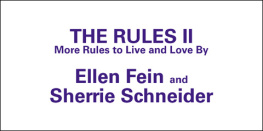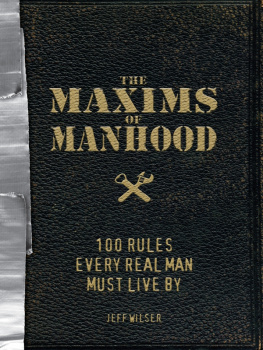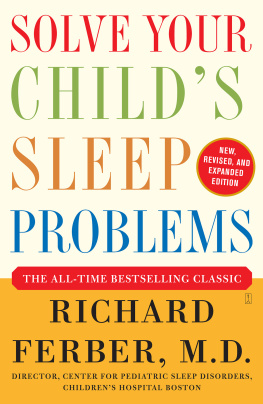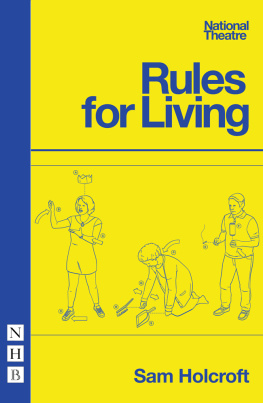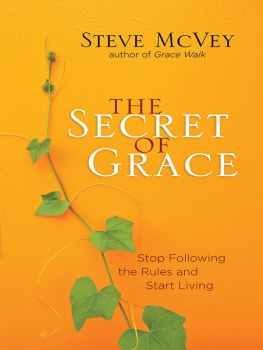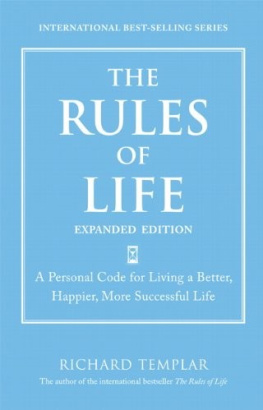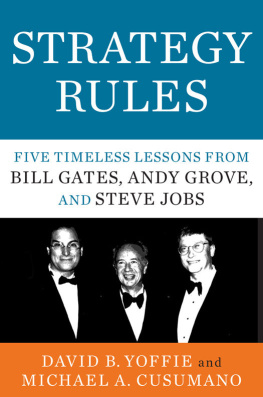Cover
Title Page
Contents
Foreword
This book is perfect for my friend Mitch Williams who, so he tells me, often starts reading books in the middle. I dont quite understand how he does that. Ive heard him explain it a dozen times: Yes, I just open the book in the middle, and start reading.
Honestly, I dont get it, but in this case, with 21 Rules , hed be spot on, because this isnt one of those books that you read front to back. Its a skip-around book. Glance the contents, enjoy the poignant quotes on every page. Pick it up, put it down. Dont make it a chore. Reading shouldnt be a chore. Perhaps thats Rule 22.
Oh, and dont miss the Appendices, all 12 of them. Theyre chock full of great wisdom none of it from me. Ive simply gathered insight from world experts, and condensed it for you.
Ive spent the better part of my adult life reading self-help books, and I finally realized that it was time to put my journalistic background to use. So this book, in essence, is a compilation of the wisdom shared over the years by self-help gurus. Ive just brought it all together for you.
Im happy to share some of my favorites (Rules 10 and 19 top the chart, along with Appendix F, titled The Human Translator), but youll soon find some of your own, and Id love to know what they are. So please send along an email (steve.ferber@gmail.com) to let me know. And dont be shy, Id love to hear from you.
The inspiration behind this book, of course, are the four women with whom Im madly in love my wife Roe (this year, we celebrate our 35th year of marriage!) and our daughters Melyssa, Natalie and Olivia. Each of them is a gift from heaven, insightful, strong, in touch, motivated, caring, and wise. I love you.
And I love the friends and family who were kind enough to answer my endless series of questions, and who allowed me to publish their answers in this book (in special sections called, not surprisingly, My Friends Share Their Thoughts). Stop and read one or two, youll be impressed with their insight.
So thank you to my sister Ilene, my sister-in-law Carole, uncle Allan, brother-in-law Bruce, cousins Chris, Jill, Marnie and Steeve (yes, its two es) and friends galore Bobbi Cordingley, Carl Eckstein, Gail Chmura, Dave Rupp, Gary Miller, Joel Ann Rea, Joe Brancatelli, John Nelson, Jerry Semper, Kathy Dowd, Karin Udler, Marley Casagrande, Mickey Filipponi, Nat Emery, Ron Taylor, Sheila Filipponi, Vicki Hutman and Vicki Sullivan.
Id also like to thank Jay Deegan, designer extraordinaire, who designed six versions of the book cover and impresses us daily with his genius. And finally, a special thank you to my good friend and colleague Elizabeth Bush who took the time to edit this book, and delight me with her comments, suggestions and critique. She is a special person. I wish each of you could meet her.
Thank you for picking this book up. I hope that it has meaning for you.
Steve Ferber
Charleston, South Carolina
September 2012
Introduction
The Window & The Wind
Mans greatness lies in his power of thought.
-- Blaise Pascal
In large measure this book is about our thoughts, the thoughts that our mind creates, and re-creates, as we experience life. Thoughts are said to be the window to our lives, but I believe that they are the wind as well.
There is no escaping the notion that our thoughts define our entire human experience -- they stand behind every word that we speak, every action that we take and (nearly) every emotion that we feel. Yet, knowing this, we spend but a fraction of our time examining our thoughts. Instead, we spend much of our day repeating tired and worn-out thought patterns.
The key to every man is his thought....
-- Ralph Waldo Emerson
This book is about changing those patterns, about thinking new thoughts, about capturing more happy moments, delivering more loving smiles. Central to our theme is the notion that we can choose what to think , that we actually have a choice about what private thoughts to ponder. But do we? Can we actually choose what to think?
Based on what we know about the physiology of the brain -- i.e., the neural competition between logic (the cerebral cortex) and emotion (the amygdala) -- it appears reasonable to speculate that:
1. We have some ability to choose what we think (though our powerful emotional centers, honed over 40,000 years for survival, can easily overwhelm our logic systems);
2. Each individuals ability to choose varies dramatically, given that each human being is a unique blend of nature and nurture;
3. We all are capable of improving -- that is, each of us can enhance our ability to choose.
Do We Really Have a Choice?
As a youngster, then a teenager and young adult, I viewed choice as nothing more than activity selection. In this context, choice meant deciding what to do next, with our personal and family time.
What book should I read next?
What restaurant should we go to for dinner?
What TV show should I watch?
Every event that a man would master must be mounted on the run, and no man ever caught the reins of a thought except as it galloped past him.
-- Oliver Wendell Holmes
If we are fortunate, our lives offer many such choices. But the concept of choice goes far beyond mere activities -- choice encompasses all that we say (the words that we speak), all that we do (the actions we take), and, as I will soon argue, nearly all that we think (the thoughts that fill our minds).
Do We Choose What to Say?
Of course. After all, to avoid offending others with our words we can simply choose not to speak, (however difficult that may seem at times). Each day were faced with thousands of decisions, none more critical than knowing when to speak and, in turn, knowing what to say. The words that we speak have enormous influence over our lives because they define the health of our relationships. This is why we must choose our words carefully, to make certain that we avoid, at all costs, speaking harshly to those whom we love.
Do We Choose What to Do?
No question. If we wanted to avoid offending others with our actions we can simply choose not to act -- to sit quietly and observe, and contemplate.
But Our Thoughts?
Can we really choose what to think ? I believe that we can. I believe that its possible to move our personal thought tracks ever so gently, in the direction that we desire. Granted, our thought patterns are deeply ingrained and may, indeed, solidify with age. But study after study, personal experience after personal experience, affirms that change is possible.
Life is the only game in which the object of the game is to learn the rules.
-- Ashleigh Brilliant
The key, of course, is awareness. After all, how can we change our patterns unless we know what they are?
Hidden From the World
By and large, our mental habits are hidden from the world. Thats why its easier for a friend to tell us to stop smoking (physical habit), than to stop being self-critical (mental habit). Chances are that our friends probably know how many times a day we smoke a cigarette, but they likely have no idea how many times a day we privately criticize ourselves.
The world is obsessed with improving our physical habits -- were told to eat a more nutritious breakfast, exercise three times a week, sleep a full eight hours a night. But where are the comparable preachings for improving our mental habits?
Yes, our mental habits may be hidden from the world, but theyre certainly not hidden from us. The truth is, if you pause long enough to actually watch your thoughts, to observe and analyze them, youll quickly notice how repetitive they are. Though each of us considers ourselves unique, and mysterious, and complex, the reality is that our thought patterns, our private thought tracks, are quite predictable.

